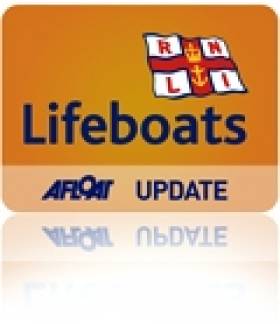Displaying items by tag: The Lifeboat Station Project
#RNLI - Jack Lowe has loved the RNLI since he was a little boy. He became a member of Storm Force, the charity’s club for children, at the age of eight – about the same time he picked up his first camera.
Now, he’s bringing his two passions together in a unique undertaking: The Lifeboat Station Project.
Jack plans to visit all 237 RNLI lifeboat stations in Britain and Ireland, photographing the view from each station along with the crew and coxswain/senior helm using wet plate collodion, a Victorian process that allows him to record stunning images on glass.
The ambitious project is likely to take three to five years to complete. Jack, who lives in Newcastle upon Tyne, travels in 'Neena' — a decommissioned NHS ambulance purchased on eBay and converted into a mobile darkroom.
Grandson of Dad’s Army actor Arthur Lowe, also an avid RNLI supporter, Jack explains: "My early childhood was spent on a Victorian schooner in Ramsgate harbour and on the Thames. My Dad is an experienced seafarer and introduced me to the wonders of lifeboats – these wonderful, powerful pieces of kit designed for heroic, lifesaving missions on stormy seas.
"From an early age, I knew that I wanted to be either a photographer or a lifeboat crew member when I grew up. Now I’m following my heart and uniting the two dreams.
"I’m using a photographic technique developed in the 1850s, around the time that the RNLI was incorporated under Royal Charter. The photographs are made directly onto glass plates known as 'ambrotypes'." Jack has already documented all 15 stations on the East Anglian coast.
“The project now enjoys an incredible extra dimension as everyone is so involved and engaged with it," he says. "The coxswain and crew can step into the ambulance and watch a portrait of themselves developing. They are entranced, often rendered speechless and sometimes moved to tears!"
Jack began drawing up plans for the project over two years ago. He says he has always had an interest in the history of photography.
"The word photography means drawing with light and that is how I think about it still. I adore photography in this very raw, basic form — light falling on chemicals. It really is magical – the final image is always a surprise, even to me."
He adds: "There’s a small global community of people interested in using these old techniques. Everyone works in their own way – and you’re always learning as you go along.
"The chemicals are the original formulae from the 1800s. It took me a long time to figure out the logistics of transporting and storing glass plates. I have a box made for each station that holds 10 sheets of 10x12” glass. Then when I get them back to Newcastle I scan them, varnish them and then place them into storage."
It’s a real labour of love, even for a dedicated RNLI fan, but Jack always looks forward to his next station visit.
Follow Jack Lowe’s RNLI photographic mission on Facebook, on Twitter or on the project’s dedicated site.





























































